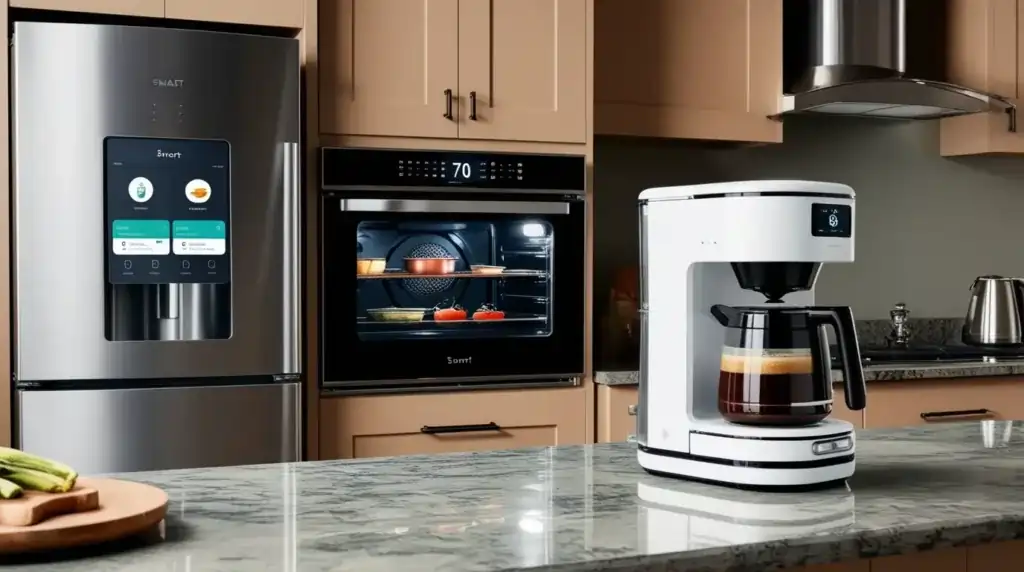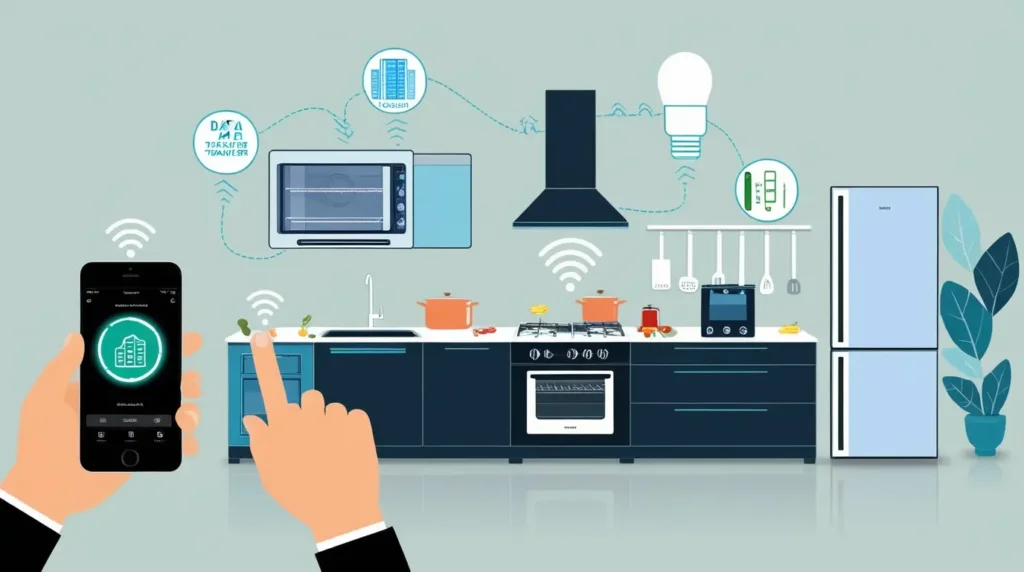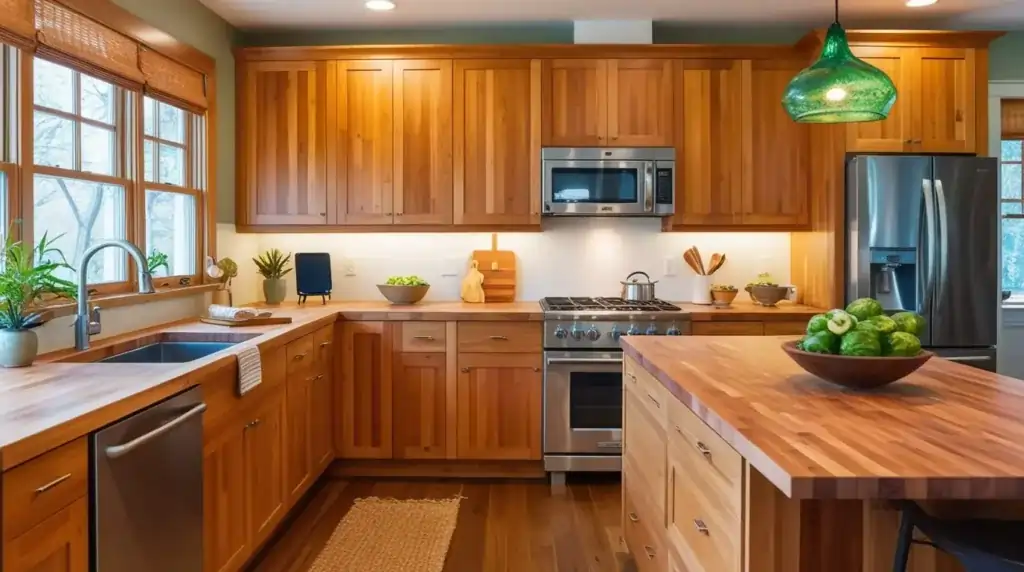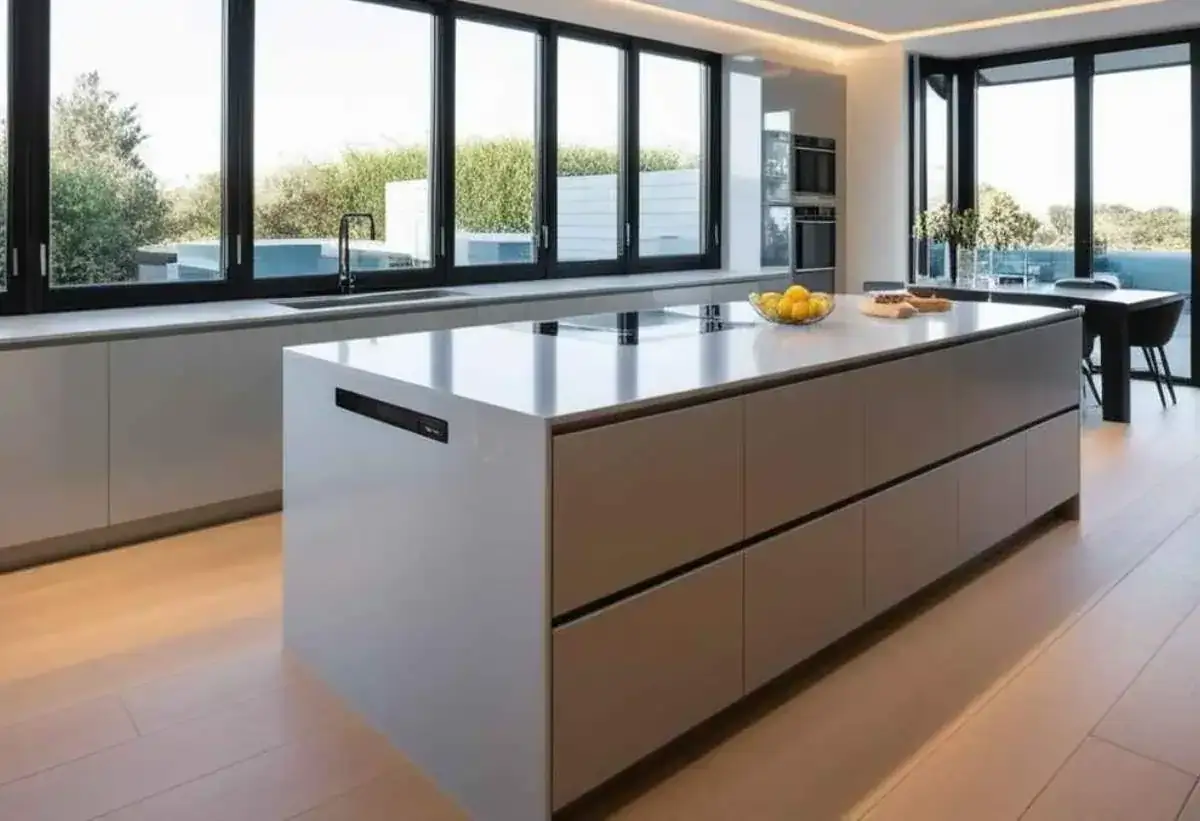The kitchen is no longer just a place to prepare food; it’s now a hub of innovation and technology. Welcome to Smart Kitchens, where convenience meets sophistication, and automation enhances the culinary experience. Whether planning a complete kitchen remodel or just adding a few smart appliances, this comprehensive guide will walk you through everything you need to know to modernize your kitchen.
Modern kitchens aren’t just about cooking anymore—they’re about seamless integration, energy efficiency, and combining high-quality materials with smart technology. This guide will help you create a dream kitchen that balances aesthetic appeal, functionality, and innovation.
Key Takeaway:
- Smart kitchens streamline food preparation, cooking, and cleaning
- Popular devices include smart ovens, smart fridges, and smart cooktops
- IoT plays a crucial role in integrating kitchen devices for automation
- Smart kitchens increase convenience, save time, and can reduce energy costs
- Future innovations will focus on sustainability, AI integration, and higher operational efficiency
What is a Smart Kitchen?
A smart kitchen integrates advanced technology into kitchen design, improving efficiency, functionality, and the overall cooking experience. These kitchens feature smart appliances, lighting, and devices controlled via smartphones or voice assistants like Alexa, Google Assistant, or Siri. The goal is to streamline everything from food preparation to cleanup.
A smart kitchen isn’t just about cool gadgets. It’s about clean lines, minimalism, and maximizing space, whether working on a large kitchen island or a more compact layout. It also involves careful storage, cooking, and counter space planning to ensure a smooth workflow. Whether you’re cooking for your family or entertaining guests, a smart kitchen can transform your cooking space into an ultra-modern, efficient, and aesthetically pleasing environment.
Key Features of a Smart Kitchen:
- Smart appliances that integrate with mobile apps or voice assistants
- Energy-efficient appliances to reduce energy consumption
- Smart lighting that adjusts based on time or activity
- Connected cooking spaces for seamless meal preparation
- Open-concept layouts and clean lines for a modern look
- Use of high-quality and eco-friendly materials for a sustainable kitchen
Must-Have Smart Kitchen Devices

Certain devices are essential for creating a smart cooking space when modernizing your kitchen. Whether working within a tight budget or going all-out with a luxury kitchen remodeling project, these smart appliances will make your life easier.
1. Smart Ovens
A smart oven allows you to set precise cooking temperatures, monitor cooking progress, and receive notifications on your phone when your food is ready. These ovens often integrate with recipe apps and smart assistants, ensuring consistency in food preparation and saving you time.
- Precision cooking
- Energy-efficient heating
- Integration with smart assistants for voice commands
2. Smart Refrigerators
One of the most popular smart appliances, smart refrigerators include features like internal cameras, touchscreen panels, and grocery tracking systems. They help you organize your groceries and suggest recipes based on what’s inside. These refrigerators are necessary to reduce food waste and streamline meal planning.
- Built-in cameras to track inventory
- Recipe suggestions based on ingredients
- Alerts for food expiration
3. Smart Cooktops and Ranges
A smart cooktop offers precise temperature control and safety features like automatic shutoff. These appliances can sync with your smart assistant, allowing you to control them remotely.
- Precise cooking temperature control
- Syncing with recipe apps for guided cooking
- Safety features like automatic shutoff
4. Smart Coffee Makers
Imagine waking up to a freshly brewed coffee without lifting a finger. Smart coffee makers allow you to schedule brewing, adjust brew strength, and even control the device remotely via your smartphone or voice assistant.
- Automated brewing schedules
- Remote control via smartphone
- Integration with smart assistants
5. Smart Dishwashers
Smart dishwashers feature eco-friendly settings that save water and energy, offer remote start capabilities, and send alerts when dishes are done. Many models use less water, making them both an eco-friendly and cost-effective choice.
- Water-saving eco modes
- Remote operation and alerts
- Energy efficiency
The Role of the Internet of Things (IoT) in Kitchens
The Internet of Things (IoT) is the backbone of a smart kitchen. It connects your appliances and devices, enabling them to communicate with each other and create a seamless cooking experience. Imagine starting your oven remotely or your fridge reordering groceries for you—IoT makes these conveniences possible.
IoT in Smart Kitchens:
- Automating kitchen functions such as cooking timers, temperature adjustments, and grocery management.
- Remote control of devices using a smartphone or voice commands.
- Energy usage optimization, ensuring appliances operate efficiently.
For example, you could be in your living room and preheat your oven via a phone app, or your smart fridge could alert you when you’re running low on milk. These devices make cooking and managing your kitchen more efficient than ever.
Enhancing Meal Preparation with Smart Technology

Smart Kitchen Appliances aren’t just about cooking—they’re about optimizing your kitchen layout for maximum efficiency. Smart Ovens and Smart Fridges are designed to work together, making cooking faster, easier, and more intuitive.
Automated Meal Preparation
Smart ovens and cooktops have features that allow for remote control, recipe integration, and precise temperature control. You can input a recipe with connected devices, and the appliance will automatically adjust the temperature and cooking time.
- Automated cooking adjustments based on recipes
- Smart thermometers for perfect doneness
- Alerts for cooking times and temperatures
Ingredient Management
Using a smart refrigerator, you can track its contents and receive alerts when items are about to expire. These fridges can also suggest recipes based on what ingredients you have, helping you minimize food waste and streamline meal planning.
- Inventory tracking and notifications for expiring items
- Recipe suggestions based on current ingredients
Smart Kitchen Design Elements
In addition to advanced appliances, a smart kitchen emphasizes contemporary design and architectural elements that promote efficiency, aesthetic appeal, and sustainability. A modern kitchen makeover goes beyond the gadgets—it’s about creating a beautiful and functional space.
1. Kitchen Layout and Space Planning
A successful kitchen remodel requires careful kitchen layout planning to maximize counter space, cooking space, and storage space. An open-concept layout is often the preferred design for modern kitchens, as it allows for easy movement between different kitchen areas.
2. Durable, High-Quality Materials

When remodeling a kitchen, choose high-quality, durable, and eco-friendly materials. Butcher block countertops, stainless steel appliances, and solid wood cabinets are popular for those seeking long-lasting, stylish design elements.
- Butcher block countertops for durability and style
- Stainless steel appliances for a sleek, modern look
- Eco-friendly materials like reclaimed wood or recycled countertops
3. Smart Lighting
A key element in any smart kitchen design is lighting. Smart lighting allows you to adjust the brightness and color of your lights with your smartphone or voice commands. Set the perfect ambiance for cooking, dining, or entertaining.
- Accent lighting to highlight architectural features
- Energy-efficient LED bulbs
- Integration with smart assistants for voice control
4. Aesthetic Appeal
Achieving a balance between functionality and aesthetics is crucial in any kitchen design. Clean lines, colorful cabinets, and modern luxury design elements create an inviting, stylish space.
- Colorful cabinets for a bold statement
- Clean lines and minimalist design
- Classic elements like natural wood finishes for a timeless look
Remodeling Your Smart Kitchen on a Budget
While high-end smart kitchen appliances are great, you can still achieve a successful kitchen remodel on a tight budget by strategically choosing your upgrades. Here’s how you can modernize your kitchen without breaking the bank:
1. Cabinet Refacing
Instead of replacing your cabinets entirely, consider cabinet refacing. This process updates your kitchen’s look without the cost of new cabinet boxes.
2. Smart Lighting on a Budget
Replace your traditional bulbs with energy-efficient smart LEDs that can be controlled via an app or voice commands. This inexpensive upgrade will enhance your kitchen’s functionality and reduce energy consumption.
3. Essential Smart Appliances
Prioritize smart appliances that will offer the most significant improvement in your daily routine. A smart coffee maker, smart oven, or smart dishwasher can make a big impact even on a budget.
The Future of Smart Kitchen Technology
The smart kitchen of the future will focus heavily on sustainability, AI integration, and greater operational efficiency. Here’s what we can expect in the years to come:
1. AI-Driven Kitchens
AI-powered assistants will help manage your kitchen in ways never thought possible. From automatically generating shopping lists to providing nutritional advice, the future kitchen will be driven by data-driven decisions and artificial intelligence.
2. Eco-Friendly Materials and Energy Efficiency
The demand for eco-friendly materials and energy-efficient appliances will continue to rise, helping homeowners reduce their carbon footprint. The next generation of smart kitchens will incorporate automation to manage energy usage effectively.
3. Integration with Intelligent Buildings
The rise of intelligent buildings and conceptual spaces
will bring kitchens into a more integrated role within the home. Smart kitchens will link directly to energy management systems, ensuring optimal energy efficiency across all household systems.
Conclusion: Is a Smart Kitchen Worth the Investment?
The future of smart kitchens lies at the intersection of technology, design, and sustainability. Whether upgrading one appliance at a time or planning a luxury kitchen remodel, creating a smart kitchen is a worthy investment that enhances convenience, efficiency, and aesthetic appeal.
For more ideas on transforming your home into a smart space, explore our DIY Smart Home Projects guide. Ready to take your kitchen to the next level? Now’s the perfect time to get started on your dream kitchen!
By the time you’re finished, your smart kitchen will be more than just a space to cook—it’ll be a state-of-the-art, energy-efficient, and beautifully designed hub in your home!
Smart Kitchen FAQs
1. What is a smart kitchen?
A modern smart kitchen has appliances, devices, and technologies designed to enhance convenience, energy efficiency, and functionality. These technologies are often connected through the Internet of Things (IoT) and can be controlled using smartphones, voice assistants, or automation systems.
A smart kitchen simplifies cooking, food management, and energy usage from smart refrigerators to voice-activated ovens.
2. What are the benefits of a smart kitchen?
A smart kitchen offers numerous benefits:
- Energy Efficiency: Smart appliances optimize energy usage, saving on utility bills.
- Convenience: Control appliances remotely or through voice commands.
- Improved Cooking Experience: Features like automated cooking, recipe suggestions, and precise temperature control make meal preparation easier.
- Food Management: Smart fridges can track inventory, alert you when items are running low, and suggest recipes based on what’s inside.
- Safety: Appliances like smart cooktops have features like auto shutoff, enhancing safety.
3. What are some must-have smart kitchen appliances?
Some essential smart kitchen appliances include:
- Smart refrigerators: With internal cameras, grocery management, and touchscreen interfaces.
- Smart ovens and cooktops: For precise temperature control and integration with recipe apps.
- Smart dishwashers: Offering eco-friendly settings and remote operation.
- Smart coffee makers: Allow you to schedule brewing or control the coffee-making process remotely.
4. How much does it cost to build a smart kitchen?
The cost of building a smart kitchen varies depending on the extent of the technology you want to integrate. On average, you can expect:
- Basic upgrades (like smart lighting and a few smart appliances): $1,000 – $5,000.
- Full kitchen remodel with smart technology integration: $10,000 – $50,000.
- Luxury kitchen remodels with premium smart appliances and custom design: $50,000+.
Careful planning is essential, especially when working with a tight budget.
5. Can a smart kitchen help me save energy?
Yes, a smart kitchen can significantly reduce energy usage. Energy-efficient appliances and smart devices are designed to consume less power by optimizing their operations. Smart lighting systems, for example, use sensors to turn off when not in use, and smart ovens adjust cooking times and temperatures automatically for efficient performance.
6. Do smart kitchens work with voice assistants?
Yes, most smart kitchen appliances are compatible with popular voice assistants like Amazon Alexa, Google Assistant, and Apple Siri. This allows you to control appliances like ovens, dishwashers, and refrigerators using voice commands, adding a layer of convenience to your cooking experience. Check out the full article Alexa vs. Google Assistant vs. Siri: Which One Understands You Best in 2024.
7. What smart technology can improve meal preparation?
Smart technology enhances meal preparation by automating and optimizing processes:
- Smart ovens provide precise temperature control, ensuring perfect cooking.
- Smart refrigerators track inventory and suggest recipes based on available ingredients.
- Smart thermometers monitor internal food temperatures to prevent overcooking.
This technology helps streamline the cooking process, allowing for more efficient and enjoyable meal prep.
8. What is the Internet of Things (IoT) in a kitchen?
The Internet of Things (IoT) refers to the interconnectedness of smart devices and appliances in your kitchen. These devices communicate with each other via the internet, enabling remote control, automation, and data sharing. For example, your smart fridge could notify your smartphone when you’re low on groceries, or your smart oven could adjust temperatures based on a recipe from an app.
9. Can I create a smart kitchen on a budget?
You can build a smart kitchen on a budget by prioritizing key upgrades and looking for budget-friendly options. Here are some tips:
- Start with smart lighting: It’s affordable and enhances your kitchen’s functionality.
- Focus on essential appliances: Get a smart oven or Smart Coffee maker before splurging on larger items like refrigerators.
- Upgrade gradually: You don’t need to transform your entire kitchen completely. Add smart devices and appliances as your budget allows.
10. Is a smart kitchen worth the investment?
Investing in a smart kitchen can be worthwhile, especially if you prioritize convenience, energy efficiency, and modern design. A smart kitchen can streamline your cooking process, improve food management, and reduce energy costs. While the upfront costs may be higher, the long-term savings on utilities and time make it a solid investment.
11. How do I start building a smart kitchen?
To start building a smart kitchen, follow these steps:
- Identify your needs: Focus on areas where smart technology would improve your cooking experience.
- Start small: Start with affordable devices like smart lighting or coffee maker.
- Set a realistic budget: Consider your long-term goals and allocate funds accordingly.
- Research compatibility: Ensure that the devices you choose are compatible with each other and your existing smart home system.
- Plan your kitchen layout: Focus on optimizing storage space, counter space, and cooking space to fit smart devices seamlessly into your kitchen design.
12. Can smart kitchens be eco-friendly?
Yes, smart kitchens can be highly eco-friendly. Many smart appliances are designed to reduce energy and water consumption. You can also incorporate eco-friendly materials like butcher block countertops or cabinets made from reclaimed wood. Additionally, features like smart dishwashers and refrigerators help minimize water waste and food spoilage.
13. How do smart refrigerators help reduce food waste?
Smart refrigerators have internal cameras and inventory tracking, so you always know what’s inside. They can alert you when food is nearing expiration, or you’re running low on essential items. Some models even suggest recipes based on the ingredients you already have, helping to reduce food waste.
14. What should I consider when designing a smart kitchen layout?
When designing a smart kitchen layout, consider the following:
- Maximize counter and storage space: Smart appliances can take up additional space, so efficient layout planning is crucial.
- Integrate technology: Make sure the kitchen island, cabinets, and other elements accommodate wiring and connections for smart appliances.
- Aesthetic appeal: Use clean lines, natural light, and contemporary design to create a seamless and visually appealing kitchen.
- Energy efficiency: Choose energy-efficient appliances to reduce your carbon footprint.
Addressing these aspects will create a modern, functional, dream kitchen that effortlessly incorporates smart technology.


